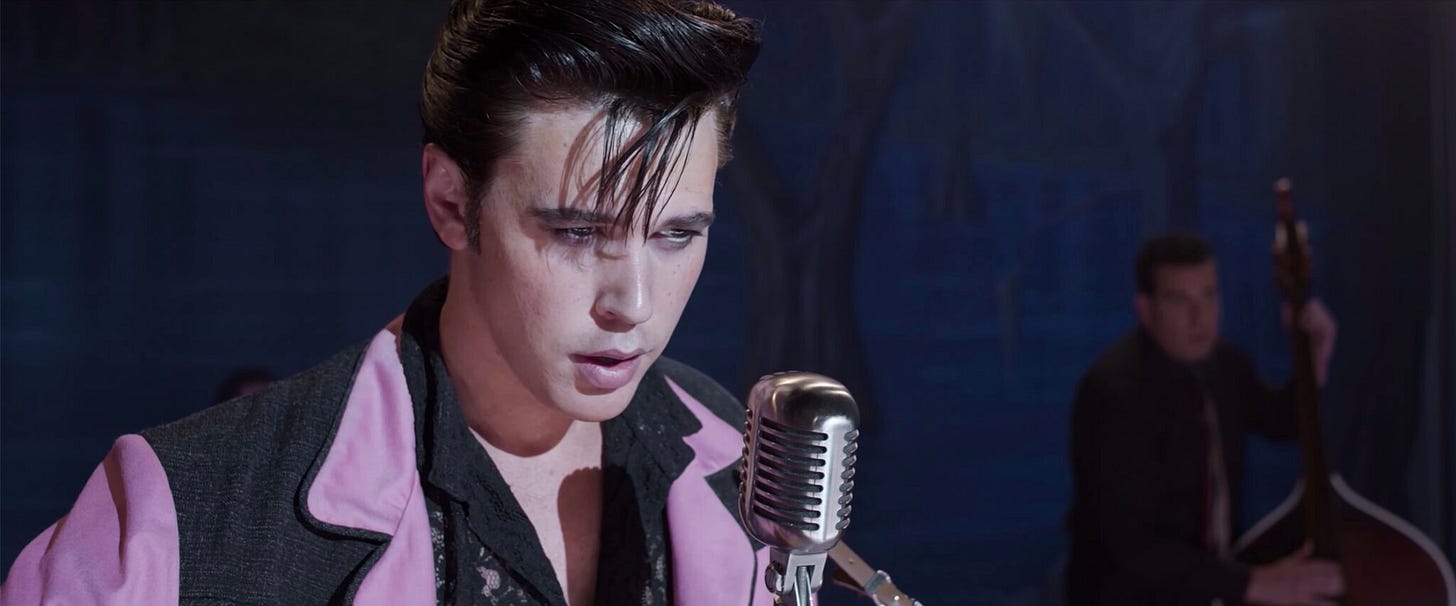The music of Elvis Presley has been a part of my life for as long as I can remember. My grandfather, being a musician himself and adoring the King, would play his copy of ELV1S: 30 No. 1 Hits for every car ride with me to Burger King or the bowling alley. I’d sing along, mistaking some of the back-up singers in “Hound Dog” as Kermit the Frog (I was 5 years old, cut me some slack). Needless to say, these Elvis tracks cut nostalgically deep; listening to “Heartbreak Hotel” or “Jailhouse Rock” reminds me of the smell of cigarettes soaked into my grandfather’s car (he, of course, never smoked with me in the car, but his seat fabric certainly retained the odor). After my grandfather’s death in 2012, I rediscovered Elvis’ discography, but he forever remained a symbol, a caricature; the iconic voice, the peanut butter and banana sandwiches, the dying on the toilet - he was never a real person. Much of his life, his triumphs and failures, his strengths and shortcomings, were completely absent from my perception of his legacy.
Somehow, Baz Luhrmann has both humanized the King and doubled down on his existence as an iconographic symbol. Perhaps this is the mission statement of Elvis: to show us that he was both fully symbol and fully man. This deification is not uncommon for the music biopic genre, which often falls into cliché, obligatory story beats, and actors desperately reaching for recognition from an industry that eats these movies up. Luhrmann’s film features all of these qualities, but with one major distinction - they are done with style. One of the most recognizable filmmakers, if not by name or face, then certainly by visuals, Luhrmann has made a reputation for himself as being all style and no substance. Perhaps this accusation is a bit harsh, though not without cause. Love it or hate it, Luhrmann does exactly what he wants to do how he sees fit. The story of Elvis Presley, an equally maximalist public figure, seems tailor made for Luhrmann’s mode of expression. Consequently, this natural fit makes for Luhrmann’s most coherent film and, quite possibly, his best.
Luhrmann’s dizzying visuals are somewhat restrained here, though this film will certainly elicit declarations that the film is a “roller coaster” or some other trite comparison. But these visuals certainly give soul to what could have been a fairly generic music biopic. The pacing moves at lightning speed, sometimes to a fault, but this always keeps a fairly structureless film interesting. There isn’t so much of a story here so much as a series of events highlighting the rise and fall of a music icon. Luhrmann loosely frames his narrative around Elvis’ canny but parasitic manager Colonel Tom Parker as the latter reflects on his life in his last moments. But this framing is inconsistent - the first half of the film almost resembles the relationship from Amadeus in that we experience the main character second-hand through an adversarial foil. But as the film progresses, it slowly forgets this framing device, minus the occasional voice-over narration from Parker, shifting firmly into Elvis’ point of view. Both approaches are valid, but either committing to one or better integrating them into one another would have been preferable.
As it stands, we feel some distance from Elvis at the start, though that gap is gradually closed as the film marches on. This is due in large part to Austin Butler’s breakout performance as the king of rock ‘n roll. Mainly relegated to supporting roles on television, Butler’s acting abilities have gone relatively unnoticed until now as he effortlessly slips into this persona. Never does his portrayal ever come off as an impersonation - Austin Butler is Elvis Presley, full stop. Much of the humanization that this film affords Elvis comes from Butler’s sympathetic portrayal, and concerts are electric thanks to Luhrmann’s visual flair. It’s simply an out-of-this-world performance that deserves the current acclaim and presumably future accolades. It is ironic, then, that one of the best performances of the year is paired with one of the worst. To be sure, Tom Hanks isn’t uniquely at fault here, but this cartoonish husk of man - fat suit, prosthetic nose, and accent to boot - clashes with the film’s tone. Baz Luhrmann is stylistic, but rarely this goofy. Parker, perhaps justly so, becomes the film’s scapegoat, framing any of Elvis’ mistakes as consequences of his victimization. But what about Elvis’ grooming of 14 year-old Priscilla, which is an entire story in itself? That wouldn’t fit into this mythology, so it is conveniently passed over.
If you know nothing about Elvis Presley or his life, then Elvis will provide you with the first true music biopic epic, dense in its breadth. But for those that want to dig deeper, the thematic material here is a bit unclear. What exactly is Baz Luhrmann trying to say about this historical figure, other than that he was an amazing performer who we lost too soon? All of that being said, if nothing else, Austin Butler’s star-making performance is a must-see, a true tour-de-force that will stand above all other portrayals of the King before or after. It’ll also give you an excuse to go back and listen to Elvis’ extensive catalog - I can smell my grandfather’s car like it was yesterday.








